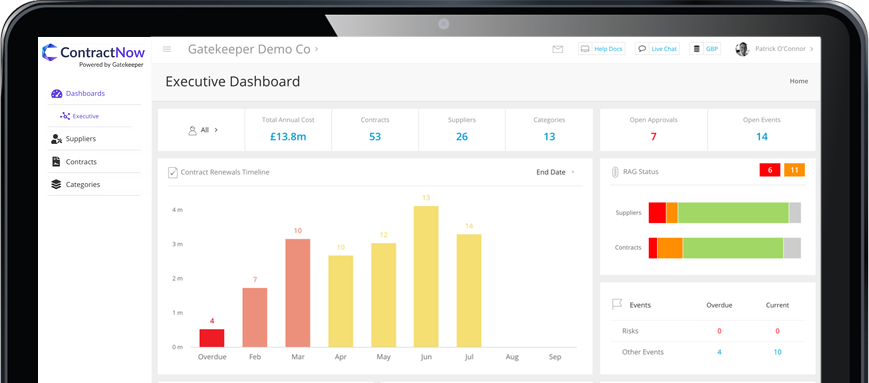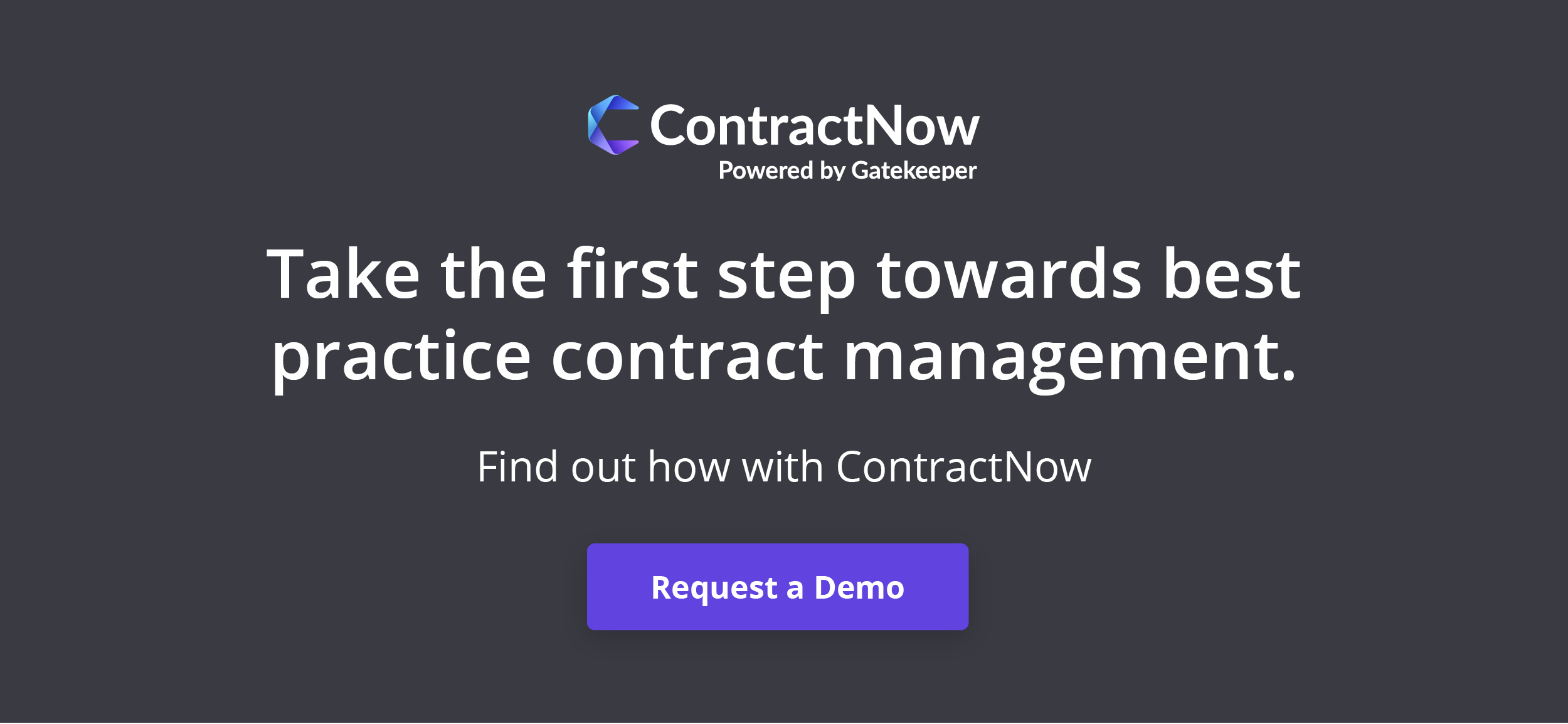As businesses continue to be disrupted by the consequences of COVID-19, they are having to come face-to-face with gaps in their contract management processes. Some businesses have had to confront that they have no formalised approach at all, while others are struggling to get their contracts in order when they’re kept in multiple shared drives and Excel sheets.
But no matter how prepared businesses believe themselves to be, even if they are using Excel contract management templates, the consequences of COVID-19 and the rapid evolution of a global remote workforce has led to more contracting questions than ever before.
A fragmented approach to contract management will quickly reveal issues around commitments and obligations, contract renewal processes moving forward and the ability to safeguard revenues."
Those handling business contracts should reassess their approach by asking themselves the following questions:
- Are all my contracts and documents in one centralised place?
- Can I easily understand my obligations?
- Can I be certain that I don’t miss key renewal dates?
- Can I easily extract key clause information and terminology such as force majeure?
- Can I still sign and send for contracts as the global workforce becomes remote?
If the answer to any of these questions is no, the business is vulnerable to increased contract risk, a breach of contract and a potential loss in revenues. It’s time to take back control by introducing the right contract management software.
Below, we take a look at what contract management is, why you need to invest in the right software and how it can help you to achieve business growth and resilience moving forward.
What is contract management?
Contract management is a set of fundamental practices that are applied to the different lifecycle stages of an agreement between two or more parties. When a best practice approach is applied, contracts are managed end-to-end and every stage from initiation to close-out is addressed.
Effective contract management gives control back to in-house teams, reduces their administrative workload and increases visibility and understanding across the entire business.
Businesses that have best practices in place will also be in a better position to renegotiate contract terms, search contract metadata quickly and build deeper relationships with suppliers."
Best practice approaches are streamlined, collaborative and automated. Businesses that still have pen and paper contracts kept in a drawer simply, or those that are juggling Excel spreadsheets, won’t be able to achieve the same levels of efficiency as those that have invested in contract management software.
 ContractNow's Executive Dashboard
ContractNow's Executive Dashboard
How your business can benefit from contract management software
As businesses continue to change the way they work and industries continue to adapt to the repercussions of COVID-19, it’s only natural that gaps in contract management become more evident or start to occur.
Contract management software will prove beneficial in any business that doesn’t have a single, unified view of its contract data. Moving your contracts and their data from your teams’ drawers, shared drives or multiple Excel sheets into a dedicated solution will immediately:
- Improve visibility of contract value, spend and key dates
- Maximise contract awareness and collaboration across the organisation
- Enable accurate reporting that can help to drive business decisions
A cloud-based contract management software not only centralises data in a contract repository but empowers businesses to take back control of their agreements. However, businesses need to be mindful that this control can’t be achieved through technology alone.
There needs to be an alignment between people, processes and technology – ensuring that the entire team has bought into the same goal, works in the same way and is using the technology correctly and consistently.
Only then will competitive advantage be unlocked.
What are the key features of contract management software?
When researching contract management software, it’s important to look beyond the immediate issues you are looking to resolve.
COVID-19 has created an economy of urgency with businesses looking to act right now but your choice of software during a time of uncertainty should be one that lays a stable foundation for the future."
Any business – regardless of industry – that works with contracts will understand the different complexities involved in each one. Software should aid the simplification of contract management, making it easier to initiate, send, view, search and renew contracts.
Given the current climate, speed is also of the essence. Below, we list some key features of powerful contract management software that will improve your overall processes.
- A centralised digital repository: understanding contract commitments becomes easier and more efficient when there is a centralised repository that can be accessed from the cloud
- Global search functionality: searching contract documents and metadata should be straightforward, especially in a time when force majeure and termination clauses are of concern
- AI Auto-extraction: in-house teams can save valuable reading time with software that automatically pulls out key contract information including values, counterparties, locations and contact names
- Automated Renewal Management: software that provides automated reminders about upcoming contract renewal dates can help businesses to gather information, understand alternatives and negotiate from a position of strength.
- Unlimited eSignatures: eSignatures allow you to send documents for signature whenever and wherever, with a full audit trail, which is particularly important as the global workforce becomes remote.
- Automated Third-Party Business Continuity Management: in a world of disruption, it’s more important than ever to maintain BCP documentation – automated management supports easy updates of contract records and related events.
- Cost savings through categorisation: it’s important to quickly identify wasted or duplicate spend, so look for a software that can help you to categorise and consolidate contracts so you can drive better prices and lower overall costs.
How to achieve ROI with contract management software
With businesses facing the repercussions of a global pandemic, it’s no surprise that budgets have tightened or frozen. The business case for new technology may be tougher than ever before so it’s important to demonstrate tangible business benefits.
Contract management software needs to successfully address existing issues and eliminate the risk of them occurring again – all while generating ROI for the business.
It may be tempting to focus on getting the next few months, but limiting yourself to immediate contracts will only provide a snapshot of information. It will also fail to generate meaningful returns in the longer term.
By moving all of your documents to a contract management solution now, you’ll always have accurate information to hand for any further unforeseen events."
Cloud-based contract management software brings visibility and control to your business’s contract portfolio and is completely scalable – meaning you can deal with any event or complexity, no matter how big or small.
By investing in software with the features mentioned earlier in this article, businesses can take steps towards return on investment through:
- Centralised records which increases visibility of issues you may not have been aware of. The aggregation and duplication of contract data can give light to duplicate spend, inconsistencies across teams and upcoming renewals which, when addressed, can improve the business’s bottom line.
- Automated contracting processes that allow you to formalise approval and renewal processes through workflow engines, improving overall accuracy and shortening time-to-signature
- Renewal reminders sent to key stakeholders ahead of key dates, giving them time to cancel unwanted contracts ahead of auto-renewal date or investigate alternative, cost-effective options that ultimately lead to cost savings.
- Successful supplier relationships built on visibility, an understanding of contract obligations, clear audits, performance management and the confidence that the best terms have been negotiated.
- Minimised contract risk reducing the risk of reputational damage, fines related to non-compliance and non-delivery due to poor supplier performance.
Conclusion
Businesses have been prompted to relook at their contract management process as a result of disruption caused by COVID-19. However, this reassessment shouldn’t be a short term fix as effective contract management is an ongoing, best practice business process.
Moving your contracts into a centralised database puts you in a stronger position to get the most value from them in the future."
Whether you have no system in place at all or if you’re relying on data kept in different sources, now is the perfect time to move that information into a dedicated contract management system – making future contract management easier and more scalable.
If you want to know more about how ContractNow can help you to overcome common contract challenges and objectives, request a demo today.




